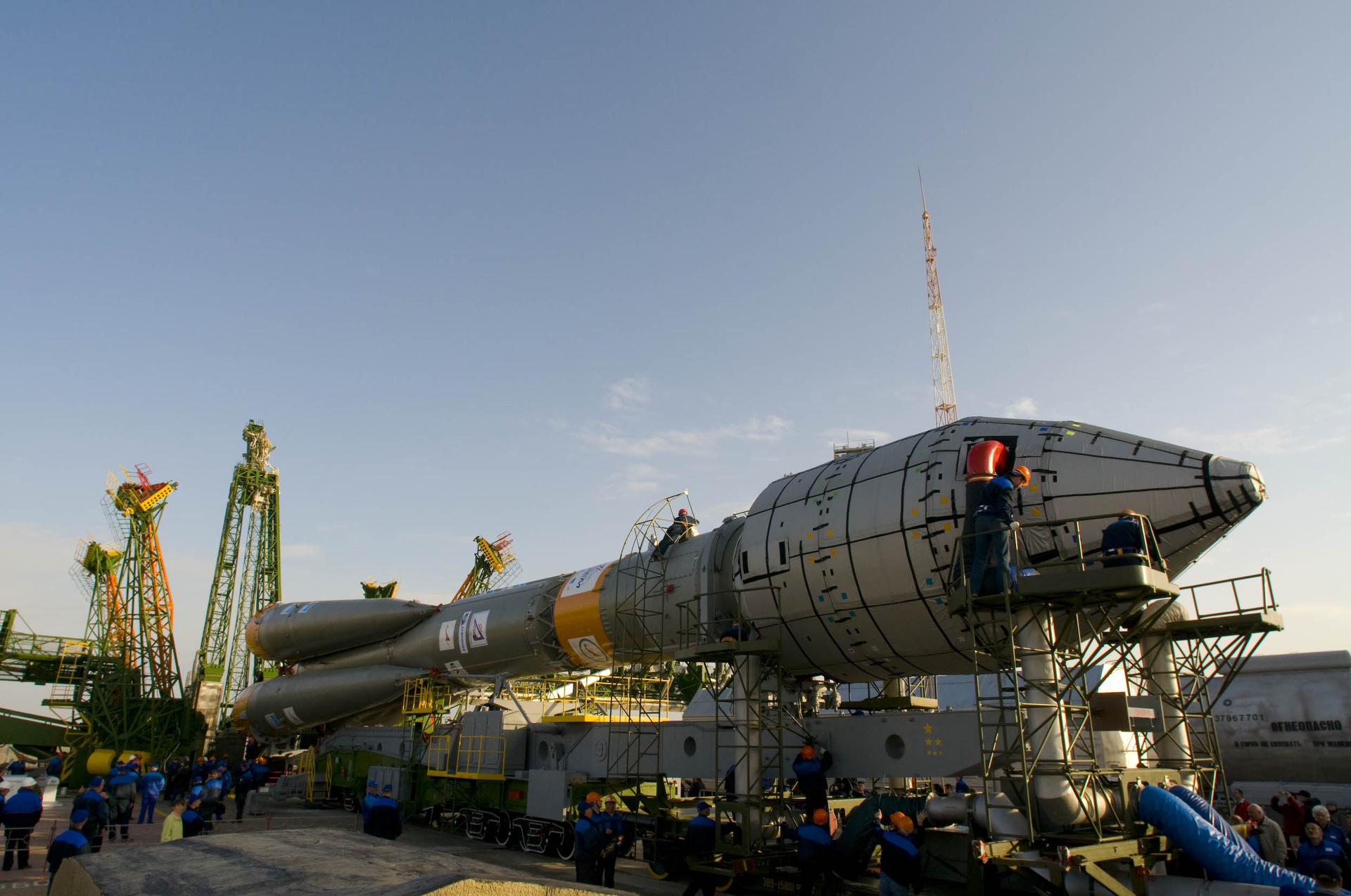
Soyuz-FG
In-activeProgress Rocket Space Center (PRSC)
June 2, 2003
Description
The Soyuz FG is a medium-lift launch vehicle qualified for manned launches and used to deliver Soyuz Spacecraft to Orbit for Missions to the International Space Station.
Specifications
-
Stages
3 -
Length
4.95 m -
Diameter
2.68 m -
Fairing Diameter
― -
Launch Mass
305.0 T -
Thrust
―
Family
-
Name
Soyuz-FG -
Family
― -
Variant
Fregat -
Alias
― -
Full Name
Soyuz-FG Fregat
Payload Capacity
-
Launch Cost
― -
Low Earth Orbit
7100.0 kg -
Geostationary Transfer
Orbit
― -
Direct Geostationary
― -
Sun-Synchronous Capacity
―
Progress Rocket Space Center
Commercial
CEO: Dmitry Baranov
PRSC 1996Progress Rocket Space Centre, formerly known as TsSKB-Progress, is a space science and aerospace research company which is known for manufacturing launch vehicles and satellites. Most notably, Progress Rocket Space Centre is the manufacturer of Soyuz launch vehicles.
Soyuz-FG/Fregat | Kanopus-V No.1 & BelKA-2
Progress Rocket Space Center | RussiaBaikonur Cosmodrome, Republic of Kazakhstan
July 22, 2012, 6:41 a.m.
Soyuz-FG | Giove-B
Progress Rocket Space Center | RussiaBaikonur Cosmodrome, Republic of Kazakhstan
April 26, 2008, 10:16 p.m.
Soyuz-FG | Radarsat-2
Progress Rocket Space Center | RussiaBaikonur Cosmodrome, Republic of Kazakhstan
Dec. 14, 2007, 1:17 p.m.
Soyuz-FG | Globalstar 66,67,68,70
Progress Rocket Space Center | RussiaBaikonur Cosmodrome, Republic of Kazakhstan
Oct. 20, 2007, 8:12 p.m.
Soyuz-FG | Globalstar 65,69,71,72
Progress Rocket Space Center | RussiaBaikonur Cosmodrome, Republic of Kazakhstan
May 29, 2007, 8:31 p.m.
Soyuz-FG | Giove A
Progress Rocket Space Center | RussiaBaikonur Cosmodrome, Republic of Kazakhstan
Dec. 28, 2005, 5:19 a.m.
Soyuz-FG | Venus Express
Progress Rocket Space Center | RussiaBaikonur Cosmodrome, Republic of Kazakhstan
Nov. 9, 2005, 3:33 a.m.
Status: Launch Successful
Mission:
Venus Express (VEX) was the first Venus exploration mission of the European Space Agency (ESA). Launched in November 2005, it arrived at Venus in April 2006 and began continuously sending back science data from its polar orbit around Venus. Equipped with seven scientific instruments, the main objective of the mission was the long term observation of the Venusian atmosphere.
Venus OrbitSoyuz-FG | Galaxy 14
Progress Rocket Space Center | RussiaBaikonur Cosmodrome, Republic of Kazakhstan
Aug. 13, 2005, 11:28 p.m.
Soyuz-FG | Amos 2
Progress Rocket Space Center | RussiaBaikonur Cosmodrome, Republic of Kazakhstan
Dec. 27, 2003, 9:30 p.m.
Soyuz-FG | Mars Express
Progress Rocket Space Center | RussiaBaikonur Cosmodrome, Republic of Kazakhstan
June 2, 2003, 5:45 p.m.
Status: Launch Successful
Mission:
Mars Express is a space exploration mission being conducted by the European Space Agency (ESA). The Mars Express mission is exploring the planet Mars, and is the first planetary mission attempted by the agency. Mars Express consists of two parts, the Mars Express Orbiter and Beagle 2, a lander designed to perform exobiology and geochemistry research. Although the lander failed to fully deploy after it landed on the Martian surface, the orbiter has been successfully performing scientific measurements since early 2004, namely, high-resolution imaging and mineralogical mapping of the surface, radar sounding of the subsurface structure down to the permafrost, precise determination of the atmospheric circulation and composition, and study of the interaction of the atmosphere with the interplanetary medium.
Mars OrbitFalcon 9
Starlink Group 6-104
Space Launch Complex 40 - Cape Canaveral SFS, FL, USAA batch of 28 satellites for the Starlink mega-constellation - SpaceX's project for space-based Internet communication system.
Falcon 9
Starlink Group 17-25
Space Launch Complex 4E - Vandenberg SFB, CA, USAA batch of 25 satellites for the Starlink mega-constellation - SpaceX's project for space-based Internet communication system.
Falcon 9
Starlink Group 10-36
Space Launch Complex 40 - Cape Canaveral SFS, FL, USAA batch of 29 satellites for the Starlink mega-constellation - SpaceX's project for space-based Internet communication system. First Starlink laun…
Falcon 9
Starlink Group 6-103
Space Launch Complex 40 - Cape Canaveral SFS, FL, USAA batch of 29 satellites for the Starlink mega-constellation - SpaceX's project for space-based Internet communication system.
Falcon 9
Starlink Group 17-13
Space Launch Complex 4E - Vandenberg SFB, CA, USAA batch of 24 satellites for the Starlink mega-constellation - SpaceX's project for space-based Internet communication system.

